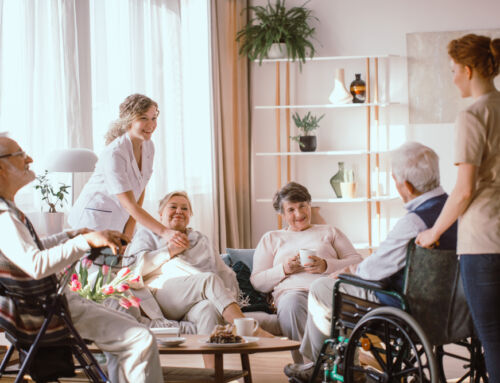Countless studies have shown that human interaction has many benefits for seniors (and conversely, loneliness is detrimental to seniors’ mental and physical health); it’s an important topic I’ve frequently written about. Indeed, humans are naturally social creatures, and it is our hardwired predisposition to crave companionship and connection, no matter our age. This is why it is so important to put aside any discomfort or embarrassment we have around the topic of seniors and sex, instead openly discussing how this normal human instinct, as well as the emotional connection it can create, affects seniors’ quality of life.
Studying seniors’ sexuality
The National Poll on Healthy Aging (NPHA) surveys about 2,000 Americans age 50–80 two to three times per year to gather data on various senior issues. Led by researchers at the University of Michigan Institute for Healthcare Policy and Innovation — including physicians, social workers, and a variety of other social scientists and analysts — the NPHA helps inform the public, healthcare providers, policymakers, and senior advocates on issues related to senior health, healthcare, and health policy.
In May of this year, NPHA, in collaboration with AARP and Michigan Medicine academic medical center, reported on the results of a survey they conducted in October of 2017 on seniors and sex, including seniors’ perspectives on relationships and their experiences related to sexual health. The sample was comprised of just over 1,000 Americans between the ages of 65 and 80, and included demographics that were representative of the overall U.S. population.
>> Related: What Seniors Must Consider Before Walking Down the Aisle
Seniors’ perspectives on sex
The findings of this NPHA survey refuted several stereotypes about seniors’ sex lives, and also showcased some significant gender and health-related gaps on important facets of seniors’ sexual health. According to the survey:
Seniors are sexually active…or at least want to be: Forty percent of seniors age 65 to 80 are sexually active. Nearly three-quarters of people in this age group have a romantic partner, and 54 percent of those with a partner are sexually active. Regardless of how active their sex life actually is, nearly two-thirds of survey respondents said they’re at minimum interested in sex, more than half said sex is important to their quality of life, and almost three-quarters said that they were satisfied with their current sex life.
Many seniors aren’t seeking help for issues related to sexual health: Nearly one in five older men in the survey group said they’ve taken medications or supplements to improve their sexual function in the past two years; just 3 percent of women in the survey said the same. In all, only 17 percent of older adults said they have talked with their healthcare provider about their sexual health in the past two years. Among those who had engaged in such discussions, most said they themselves brought the topic up…not their healthcare provider…even though sexual health is closely tied to seniors’ quality of life, health, and well-being.
Overall quality of health is correlated to sexual health: Forty-five percent of respondents who categorized themselves as being in excellent, very good, or good health reported they were sexually active. In sharp contrast, only 22 percent of seniors who classified themselves as being in fair or poor health were sexually active, and among this less healthy group, only 28 percent said they were extremely or very satisfied with their sex lives.
There are marked divisions when it comes to age, sexual activity, and drive: The survey found that seniors who are between age 65 and 70 were nearly twice as likely as those in their late 70s to be sexually active. One-third of those in their late 60s said they were extremely or very interested in sex, compared with fewer than one in five for those in their late 70s.
The gender gap for sexual interest is stark: Among the senior women surveyed, roughly one-third stated that they are sexually active, compared to one-half of men, however women were more likely to be extremely or very satisfied with their sex lives. Eighty-four percent of senior men said sex was an important part of a romantic relationship, versus 69 percent of older women. But the widest gulf between men and women was in their level of interest in engaging in sexual activity. Half of men aged 65 to 80 said they were extremely or very interested in sex, compared to only 12 percent of women in the same age range.
>> Related: The Unexpected Cost of Divorce in Retirement
Using survey results to make positive changes for seniors
Overall, the NPHA survey shows that many seniors are remaining sexually active or are at least interested in being sexually active. Far from being taboo, this is a fact that retirement communities, such as continuing care retirement communities (CCRCs), should be mindful of, looking for ways to respect seniors’ desire to find and nurture romantic relationships. After all, their residents are sexual beings, regardless of their age or health status, and sexual health remains important to seniors’ overall quality of life.
>> Related: Dating and Intimacy in Retirement Communities
The survey also revealed that healthcare providers should be more proactive in initiating honest conversations with their senior patients about their sexual health and activity level, for a variety of reasons. For example, physicians should explain to senior patients that there are options available for those who are struggling with facets of their sexual health, from new medications to help with sexual disfunction to treatments for the libido-sapping side effects of certain other medical treatments or health conditions.
Finally, the survey highlights the importance of medical professionals discussing sexually transmitted diseases (STDs) with their sexually active senior patients. While some seniors may feel safe engaging in unprotected sex since pregnancy is no longer a concern, the fact remains that rates of STDs (including syphilis, chlamydia, genital herpes, and even AIDS) are skyrocketing among older people, according to data from the U.S. Centers for Disease Control and Prevention. Medicare beneficiaries do have access to free STD screenings and counselling, a service that 2.2 million seniors utilized in 2011 and 2012.






